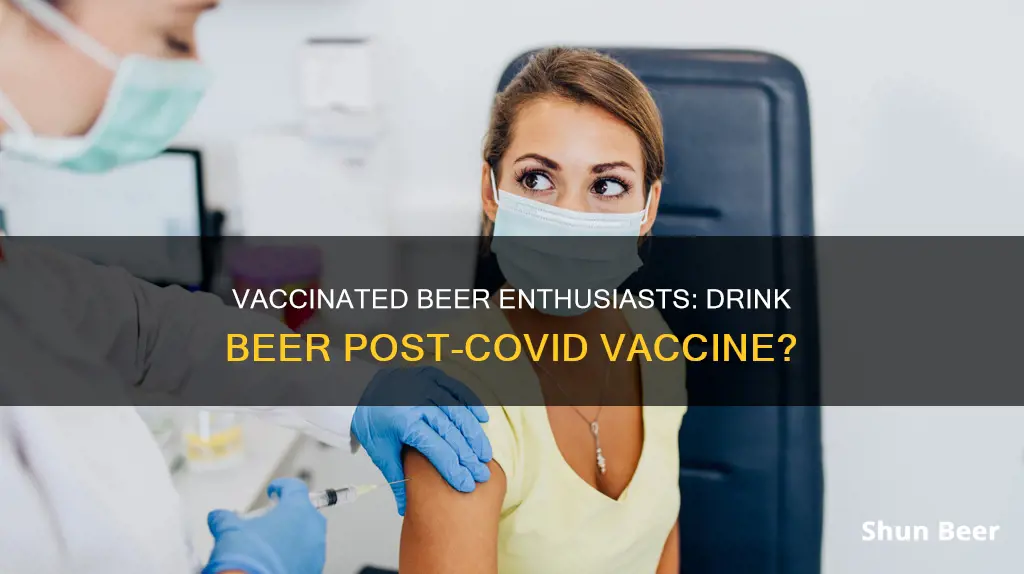
There is no official guidance on drinking alcohol after receiving a COVID-19 vaccine or booster. However, some experts advise against drinking alcohol, especially heavily, immediately after vaccination. While there is no evidence that alcohol affects the efficacy of the vaccine, it may be best to avoid it for a few days, as hangover symptoms such as fatigue, headache, and nausea may mimic or worsen the side effects of the vaccine. Additionally, excessive alcohol consumption can suppress the immune system and increase the risk of sickness, which may be a concern as it can take weeks for the body to generate protective levels of antibodies after a COVID-19 vaccine.
| Characteristics | Values |
|---|---|
| Is there any official guidance on drinking alcohol after the COVID-19 vaccine? | No, there is no official guidance. |
| Is there any evidence that drinking alcohol affects the efficacy of the vaccine? | No, there is no evidence that drinking alcohol affects the efficacy of the vaccine. |
| Is it safe to drink alcohol after the COVID-19 vaccine? | Excessive drinking after the COVID-19 vaccine can mask side effects and impair the immune response. |
| What is the recommended alcohol consumption? | The CDC defines moderate alcohol consumption as up to one drink per day for women and two for men. |
| What is considered heavy drinking? | Heavy drinking is defined as four or more drinks on any day for men and three or more drinks for women. |
What You'll Learn
- There is no official advice to avoid drinking alcohol after the COVID-19 vaccine
- Excessive drinking after vaccination can mask side effects and impair the immune response
- Alcohol does not interact with the COVID-19 vaccine
- Moderate drinking is unlikely to impair the immune response to the COVID-19 vaccine
- Heavy drinking may suppress the immune system and interfere with your vaccine response

There is no official advice to avoid drinking alcohol after the COVID-19 vaccine
According to the CDC, moderate alcohol consumption is defined as one drink or less per day for women and two drinks per day or less for men. Drinking too much alcohol on a regular basis can inhibit your immune system and affect your body's ability to fight infection. Excessive alcohol consumption can also exacerbate vaccine side effects and weaken the immune system's response.
Some studies have shown that chronic, heavy alcohol use will impact your immune system response and lower your immunity. Other research has shown that even a single episode of binge drinking can hinder your immune system. However, moderate drinking is generally considered benign, and some studies have even found that small or moderate amounts of alcohol might benefit the immune system by reducing inflammation.
If you do choose to drink alcohol after getting the COVID-19 vaccine, it is important to drink in moderation and be mindful of potential side effects.
Beer at Work: Is It Allowed in Europe?
You may want to see also

Excessive drinking after vaccination can mask side effects and impair the immune response
While there is no conclusive evidence that alcohol affects the COVID-19 vaccine's effectiveness, excessive drinking after vaccination can mask side effects and impair the immune response.
It is well-accepted that alcohol consumption affects the immune response. Studies show that alcohol disrupts immune pathways and can impair the body's ability to defend itself against infection. Chronic heavy drinking has been shown to increase the risk of bacterial and viral infections. A 2021 study in Antioxidants found that binge drinking increases gut permeability, allowing toxins, bacteria, and other foreign substances to leak through the gut wall, fuelling a state of low-grade chronic inflammation.
In addition, hangover symptoms such as fatigue, headache, and nausea may mimic or worsen the side effects of the COVID-19 vaccine. This may make it difficult to distinguish between the adverse effects of vaccination and those of excessive alcohol consumption.
Therefore, while there are no official recommendations to avoid alcohol before or after receiving the COVID-19 vaccine, excessive drinking can impair the immune response and make it challenging to identify vaccine side effects. It is advisable to give your body time to recover from vaccination and consult a healthcare professional if you experience any concerning side effects.
Drinking Beer While Driving in California: What's Allowed?
You may want to see also

Alcohol does not interact with the COVID-19 vaccine
There is no conclusive evidence that alcohol interacts with the COVID-19 vaccine. The Food and Drug Administration (FDA) does not list alcohol as a contraindication for vaccines, and there is no official advice to avoid drinking alcohol after the COVID-19 vaccine.
However, excessive drinking can have negative health consequences and may affect your immune response. Alcohol consumption can cause fatigue, headache, and nausea, which may be mistaken for or worsen the side effects of the COVID-19 vaccine. It is important to note that chronic, heavy alcohol use will impact your immune system response and lower your immunity. Therefore, while alcohol may not directly interact with the COVID-19 vaccine, it is advisable to drink in moderation and consult with a healthcare professional if you have any concerns.
The Immune Response and Alcohol
It is well-accepted that alcohol consumption affects the immune response. Studies show that alcohol disrupts immune pathways and can impair the body's ability to defend itself against infections. Chronic heavy drinking has been linked to an increased risk of bacterial and viral infections.
Alcohol and the COVID-19 Vaccine
Some research suggests that alcohol consumption may impact the effectiveness of the COVID-19 vaccine. For example, a 2023 review found that alcohol may activate ACE2 receptors, which are the same receptors targeted by the COVID-19 virus. The review also suggested that chronic alcohol consumption may exacerbate heart problems after receiving an mRNA COVID-19 vaccine.
Precautions and Recommendations
While there is no official guidance on drinking alcohol after the COVID-19 vaccine, some experts advise against heavy drinking immediately after vaccination. This is because the side effects of a hangover, such as fatigue, headache, and nausea, may be mistaken for or worsen the side effects of the vaccine. It is recommended to wait a day or two after vaccination for any side effects to dissipate and always to drink in moderation.
Additionally, if you take acetaminophen (Tylenol) to manage vaccine side effects, it is important to limit your alcohol intake as combining these can cause liver injury.
Beer and Teeth Whitening: What You Need to Know
You may want to see also

Moderate drinking is unlikely to impair the immune response to the COVID-19 vaccine
However, the effects of alcohol on the immune system are complex and paradoxical. For example, an older study on animals and humans suggested that moderate alcohol consumption, unlike chronic alcohol exposure, enhances the response to classical vaccines. Furthermore, a 2020 study published in the journal Alcohol and Alcoholism found that moderate drinking did not significantly change the immune systems of healthy non-chronic-drinking adults.
In addition, there is no official advice to avoid drinking alcohol after the COVID-19 vaccine. Some experts advise against drinking right after getting vaccinated, as hangover symptoms like fatigue, headache, and nausea may mimic or worsen the side effects of the vaccine. However, there is no evidence that alcohol affects the efficacy of the vaccine.
It is important to note that excessive alcohol consumption can increase the risk of immune-related conditions and negatively impact the immune system. Therefore, it is generally recommended to drink in moderation, especially when it comes to consuming alcohol around the time of receiving a vaccine.
Beer and Cancer: What's Safe to Drink?
You may want to see also

Heavy drinking may suppress the immune system and interfere with your vaccine response
While there is no conclusive evidence or official advice to avoid drinking alcohol after receiving the COVID-19 vaccine, heavy drinking may suppress the immune system and interfere with your vaccine response.
Excessive alcohol consumption can have detrimental effects on the immune system, increasing susceptibility to infections and compromising the body's ability to defend itself. Heavy drinking lowers your immune system, making you more susceptible to the flu, the common cold, and even more severe respiratory infections such as pneumonia, tuberculosis, and acute respiratory distress syndrome (ARDS). This is because alcohol can reduce the number and function of crucial immune cells such as macrophages, T-cells, and C-cells. It can also disrupt the gut barrier, allowing bacteria to pass into the bloodstream and causing inflammation and potential liver damage.
Additionally, drinking alcohol may worsen the side effects of the COVID-19 vaccine, such as fatigue, headache, and nausea. It is advisable to abstain from or reduce alcohol intake for a few days after vaccination to avoid these potential adverse effects.
Some studies suggest that even a single episode of binge drinking can hinder the immune system, while chronic heavy alcohol use will undoubtedly impact your immune response and lower your immunity. Therefore, it is essential to drink in moderation, especially if you have received the COVID-19 vaccine or are planning to get vaccinated.
If you choose to consume alcohol, it is important to do so in moderation and be mindful of combining alcohol with certain medications, such as acetaminophen, as it can cause liver damage.
Exploring the Legal Drinking Age: Beer and the Law
You may want to see also
Frequently asked questions
There is no evidence that having a drink or two can render any of the current COVID vaccines less effective. However, heavy drinking may suppress the immune system and potentially interfere with your vaccine response. Therefore, it is recommended to drink in moderation.
Moderate drinking is generally defined as no more than two drinks a day for men and a maximum of one drink a day for women.
Excessive drinking after vaccination can mask side effects and impair the immune response. Alcohol can cause headaches, but so can the COVID vaccine, and drinking excessively may worsen these side effects.







